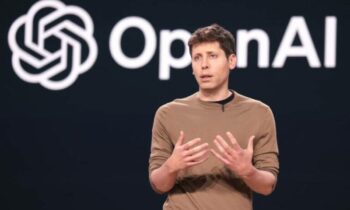Google, a division of Alphabet, is doing everything in its power to enhance the range of products it offers thanks to its developing generative AI capabilities.
In this context, the business recently updated Chrome 121 with generative AI features, such as a “Tab Organizer” and a theme builder.
Interestingly, by tapping the downward-facing symbol in the top-left corner of Windows or the right corner of macOS, you can activate the Tab Organizer feature, which automatically builds tab groups based on open tabs.
Additionally, the feature offers a name and emoji-filled Tab Group proposal that users must manually approve and rate up or down.
Furthermore, Chrome now offers six recommended alternatives and recent creations for users to generate personalized themes for the New Tab Page utilizing a generative AI text-to-image diffusion model.
It is anticipated that the adoption of these new generative AI features would increase Chrome browser traffic. Consequently, it is anticipated that this will strengthen the Google Services division, which has been Alphabet’s main driver of development.
Growth of Generative AI-Powered Product Offering
In addition to the most recent generative AI features added to Chrome, Google’s Art Selfie 2 matches users’ faces with previously created artworks using generative AI, enabling users to locate doppelgängers.
Additionally, Art Selfie 2 employs generative AI to produce a stylized image of users’ faces. It does this by integrating your selfie into a pre-selected scene and letting you to change things like your hair, jewelry, clothes, and headwear.
To improve its generative AI skills for virtual assistance, Alphabet also unveiled an AI support assistant that lets users ask questions, elaborate on them, and explore the sources of the answers. Users may also suggest follow-up inquiries.
Additionally, the business plans to launch a “Help me write” tool for Chrome desktop users that is driven by generative AI. With fewer options than Docs or Messages, this new AI function can modify its writing style. It can “Shorten” or “Elaborate” as well as “Casual” or “Formal” options.
The company will improve user experience as a result of its expanding efforts to include generative AI capabilities into its product offerings, which will enable Alphabet to take advantage of the market’s growth prospects.
The global generative AI market is anticipated to grow at a compound annual growth rate (CAGR) of 34.1% between 2023 and 2032, reaching $191.8 billion, according to a report by Allied Market Research.
In the short future, stabilizing prospects in the burgeoning gen AI market should help Alphabet’s overall financial performance.
Increasing Rivalry
The most recent action is probably going to help Alphabet maintain a competitive edge over competitors like Microsoft MSFT, Amazon AMZN, and Meta Platforms META, which are also working hard to take advantage of the growth prospects in the rapidly expanding generative AI field.
Notably, ChatGPT and other Microsoft OpenAI language models were used to construct the GPT Store, a marketplace where users could design custom chatbots for a variety of uses, including developing recipes and negotiating salaries.
Furthermore, Microsoft intends to provide users with customized versions of its generative AI assistant, Copilot, known as Copilot GPTs. These GPTs will be customized for particular uses, such as business, travel, or fitness.
In the meantime, Alexa, Amazon’s virtual assistant, now has generative AI capabilities that improve voice interactions, real-time information, smart home control, and entertainment.
Additionally, Titan Image Generator—a generative AI model that can produce original photos or alter preexisting ones—was launched by Amazon and is presently accessible in preview on Bedrock’s AI development platform. With the help of English natural language prompts, this picture generator application can produce realistic graphics for media, e-commerce, and advertising.
Conversely, Meta introduced Meta AI, a sophisticated chatbot that works with Quest 3, Ray-Ban Meta smart glasses, Instagram, WhatsApp, and Messenger. It offers lifelike visuals and real-time information.
Using Bing’s search relationship, Meta AI leverages its cutting-edge core language model, Llama 2, to facilitate text-based conversations, retrieve real-time information, and provide tools for generating images.



